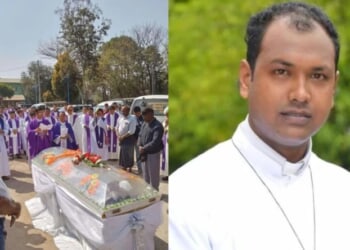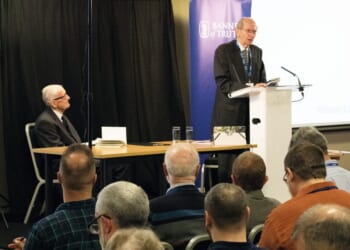Dr Neil Shastri-Hurst is MP for Solihull West and Shirley.
Some moments remain with you for life. I can still remember this one like it was yesterday.
The couple, in their mid-forties, were already in the sterile confines of the Emergency Department’s family room, with its nondescript furnishing and strobe lights flickering. Sitting in silence before me, their eyes reddened by tears and hands clasped together in hope.
I was about to bring their world crashing down. It fell to me to tell them their son had died.
Died on a night out. Yet another young victim of the endemic knife crime which has afflicted far too much of this country for far too long.
They visibly shook with raw emotion. If this were an isolated occasion, it would still be one too many. However, as a clinician working in major trauma in Birmingham, this was sadly anything but.
Last year almost 4,000 people were admitted to hospital in England and Wales as a result of an assault by a sharp object. This number has been rising, and contrary to what may be expected almost two thirds are aged 24 or older.
The statistics for offences involving a knife or sharp instrument are even more stark. After a dip during COVID, the numbers have steadily increased over recent years – reaching 50,500 in 2023/24 – almost back to their historic high of over 52,000 in 2019/20. This ONS data also excludes Greater Manchester and therefore underrepresents the problem.
This trend means offences involving a knife or sharp instrument have risen by more than a third since the day I had to deliver that awful news. It is a terrifying statistic and serves to highlight the scale of the issue we face in this country.
My own area of the West Midlands recorded the highest rate of knife crime by Police Force area – at 178 offences per 100,000 population. Compared with Dyfed-Powys, with 29 offences per 100,000 population, North Yorkshire, with 36 offences per 100,000, and Wiltshire with 38 offences per 100,000. It is self-evident this is a predominantly urban problem.
Prior to entering Parliament, I wrote about how we need a three-phase approach to tackle the problem: through effective prevention, tougher enforcement and sentencing, and rehabilitation. Now as an MP, I will be able to use my platform to make the argument for this approach effectively and persuasively.
Firstly, there is a moral duty to make family units stronger – providing the stable upbringing and sense of place young people need to avoid sliding into criminality and anti-social behaviour.
We need even more good schools in deprived areas, delivering the education and opportunities that act as a crucial deterrent to a life of crime – but I’m concerned the Government’s schools bill will in fact do the opposite. And to complement this with quality mentorship, educational programmes, and Police liaison work – focused on deterring gang culture and breaking the cycle of violence, as well as breaking the culture of welfare that denies some young people the structure, a sense of purpose, and self-pride that gained in the workplace.
When it comes to enforcement, this can only be achieved by increased neighbourhood policing presence on our streets; providing a visual deterrent to those considering carrying an offensive weapon.
Whilst there remain knives on the streets tonight, tomorrow night, and the nights thereafter, stop and search must form part of the effective Police armoury to keep people safe.
Finally, there should be no doubt in anyone’s mind that anyone convicted of carrying a knife should expect to receive a custodial sentence.
There is equally a moral duty to reduce reoffending, including through the reform of our prisons and Young Offender Institutions by making governors accountable for re-offending rates.
Greater engagement with the voluntary and private sector to provide drug and educational programmes to help young people make positive life choices is also a necessity. And, upon release, young offenders must be supported through the provision of mentorship schemes and work programmes to help them get into employment and meaningfully contribute to society.
Yet these are all long term solutions – in the meantime sadly more people will fall victim to knife related violence. So we need to improve education and understanding amongst the wider population about how to respond effectively following a deliberate, violent attack.
Such education should be targeted at all levels, including school age children – ensuring it is delivered in a sensitive and age appropriate way. citizenAID is a charity doing some outstanding work in this field. Co-founded by, amongst others, two of my former bosses, Professor Sir Keith Porter, under whom I worked at University Hospitals Birmingham, and Major General Tim Hodgetts, under whom I served in the British Army, citizenAID’s focus is upon preparing individuals, organisations, and communities to help themselves and each other when there are multiple casualties and lifesaving interventions are required.
citizenAID’s tailored learning runs all the way from Key Stage 1 to adulthood, and is built around the “train the trainer” model. It is easily absorbed, relatively uncostly to teach, and, once trained, the learning can be cascaded down throughout organisations. Training such as this can genuinely save lives, which was why I was delighted to host citizenAID, in Parliament, earlier this year to demonstrate the programme to parliamentarians.
However, we must go further; which is why such training needs to become a mandatory part of the national curriculum. Delivering lifesaving skills, which we hope will never be required but are there should the worst happen.
Taken together we can ensure that the conversations like the one I had to have with those devastated parents become the rarity they should be, instead of the more frequent occurrence they have become.



![Former Bravo Star Charged After Violent Assault Using a Rock-Filled Sock in Tennessee Walmart [WATCH]](https://www.right2024.com/wp-content/uploads/2025/07/Former-Bravo-Star-Charged-After-Violent-Assault-Using-a-Rock-Filled-350x250.jpg)



![NYC Man Snatches Child Off The Sidewalk, Parents Chase Him Down [WATCH]](https://www.right2024.com/wp-content/uploads/2025/07/NYC-Man-Snatches-Child-Off-The-Sidewalk-Parents-Chase-Him-350x250.jpg)
![Karoline Leavitt Levels CNN's Kaitlan Collins and Other Legacy Media Reporters [WATCH]](https://www.right2024.com/wp-content/uploads/2025/07/Karoline-Leavitt-Levels-CNNs-Kaitlan-Collins-and-Other-Legacy-Media-350x250.jpg)
![Man Arrested After Screaming at Senators During Big Beautiful Bill Debate [WATCH]](https://www.right2024.com/wp-content/uploads/2025/06/Man-Arrested-After-Screaming-at-Senators-During-Big-Beautiful-Bill-350x250.jpg)
![Illegal Alien Walked Free After Decapitating Woman, Abusing Corpse for Weeks [WATCH]](https://www.right2024.com/wp-content/uploads/2025/07/1753013138_Illegal-Alien-Walked-Free-After-Decapitating-Woman-Abusing-Corpse-for-350x250.jpg)






